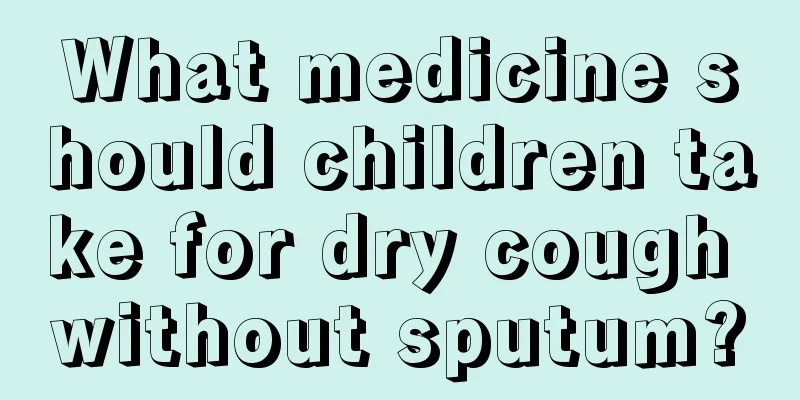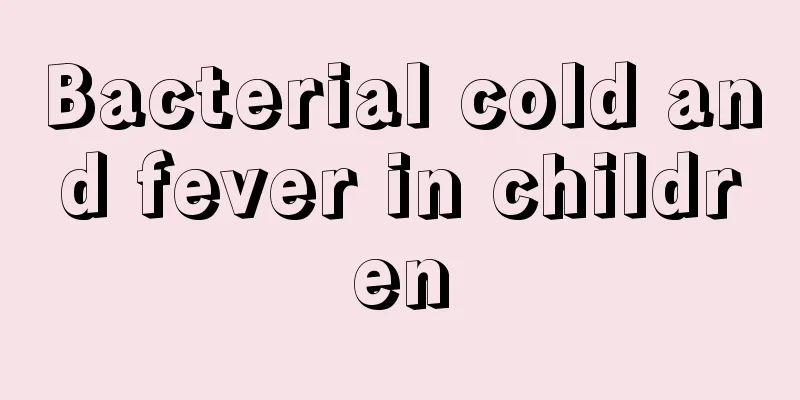Why does my baby sweat so much?

|
The baby's body resistance is relatively fragile, so we need to take good measures to keep the baby warm. When the baby starts to sweat coldly, we should check whether it is due to night sweats or coldness. This is because the baby is weak and suffers from physiological sweating while sleeping. In this case, the baby should be allowed to move more and supplement calcium, and then pay attention to the baby's skin cleanliness. Cold sweats may also be caused by diseases such as hypoglycemia. 1. What is the reason for the baby's cold sweat? When infants and young children just fall asleep, they sweat on their head and neck, but the sweating decreases after they fall asleep. This sweating is normal physiological sweating. If it is night sweats or spontaneous sweating, it may be that the baby has a weak constitution and often sweats in flakes on the head, chest, and back during daytime activities or after falling asleep at night. This is often caused by improper feeding or poor digestion and absorption. In addition, dressing your baby too much or covering him with too thick a blanket can also cause excessive sweating. Children's sweating may also be caused by calcium deficiency. If the baby has a weak constitution and suffers from the following diseases, it may also cause night sweats: Tuberculosis: Babies with tuberculosis will not only sweat in the first half of the night, but also in the second half of the night and before dawn. Rickets: Babies with rickets will start to sweat a lot after falling asleep, especially on their heads, which may soak the pillow or pillowcase, and they will also have bald spots on the pillow and cry in fear. Hypoglycemia: If your baby has hypoglycemia, he or she will often sweat a lot before daybreak, and will also have a pale complexion and a weak and rapid pulse. In short, parents should carefully distinguish children's sweating during sleep. If they find that their baby is suffering from night sweats, they should seek medical attention in time to rule out excessive sweating caused by certain diseases. 2. The difference between baby sweating and cold sweating When a baby sweats normally due to exercise, sun exposure, fever, etc., it is spontaneous sweating, which is often manifested in hot hands and feet, also known as hot sweat; night sweats are a kind of sweating disorder, which is abnormal sweating, that is, the baby sweats unconsciously when he is quiet or after falling asleep. These situations are called night sweats, and the baby's sweating is often manifested in cold hands and feet. 3. The harm of cold sweat in babies Children are in a period of rapid growth and development, and are more prone to malnutrition and low resistance. Therefore, if the child has night sweats, the mother does not need to panic too much, but of course she should pay enough attention to it. Especially now that the weather is getting cooler, excessive sweating causes the skin pores to open and close in disharmony, and the evaporation of sweat on the skin's surface lowers the body's surface temperature, which can easily cause a cold. At the same time, children's excessive sweating can lead to the loss of trace elements and electrolyte imbalance in the body, and cause inattention, which can affect development and learning to a certain extent. What should I pay attention to after my baby has cold sweats? 1. After a child sweats, you should wipe the skin dry with a dry towel and change clothes in time, and move briskly to prevent the child from catching a cold. 2. Pay attention to replenish water and salt in time. You can supplement with oral rehydration salts, referred to as "ORS", or add some salt and sugar to boiled water. Sugar can promote the absorption of water and salt. 3. Bedding should also be dried frequently. The function of sunlight is not only to heat and dry, but also to disinfect and sterilize. 4. In addition, children who are prone to sweating should undergo planned physical exercises, such as sunbathing, cold water baths, etc., to strengthen their physical fitness and improve their adaptability. Your physical condition will be improved and your sweating will stop, which is better than any panacea. 5. Strengthen children's physical fitness, pay attention to dietary nutrition, and eat more high-protein and vegetable foods. Avoid spicy and irritating foods. 6. Pediatric massage: Parents can enhance the parent-child relationship by regularly giving their children pediatric massage. |
<<: What causes kidney disease in children?
>>: The baby loves to exert himself and make noises
Recommend
Red spots on the child
There are many reasons why children have red spot...
How to treat drooling in children
It is normal for children to drool. It is not com...
What are the causes of recurrent tonsillitis in children?
Children's illness is the most worrying thing...
How to treat atrial septal defect in newborns
Atrial septal defect in newborns is a congenital ...
Does vulvar adhesion in children require surgery?
The vulva refers to the female reproductive part....
What should I do if my child does not grow teeth?
Children will start to grow teeth when they reach...
What causes a heart murmur in a child?
Every parent hopes that their children grow up he...
What are the hidden dangers of children's shoes? How to choose them safely?
As the saying goes, "Although the sparrow is...
What should I do if my child hits his forehead?
Children are very naughty. It is inevitable that ...
What is the development standard for babies over five months old?
The baby's development is an issue that every...
What are the early symptoms of hypothyroidism in infants?
Babies' physical fitness is not like that of ...
Symptoms and treatment suggestions for three-month-old babies with colds
A cold is a disease that can be serious or minor....
What can children eat to improve their memory?
Memory is very important for everyone, especially...
Fever after rash in infants
Children often suddenly develop some diseases whe...
How to treat tinnitus in teenagers
Many friends who suffer from tinnitus do not pay ...









